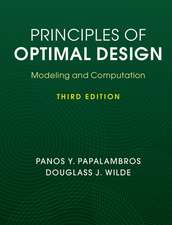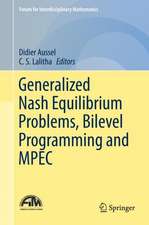Knapsack Problems
Autor Hans Kellerer, Ulrich Pferschy, David Pisingeren Limba Engleză Paperback – 7 dec 2010
| Toate formatele și edițiile | Preț | Express |
|---|---|---|
| Paperback (1) | 1556.33 lei 6-8 săpt. | |
| Springer Berlin, Heidelberg – 7 dec 2010 | 1556.33 lei 6-8 săpt. | |
| Hardback (1) | 1562.80 lei 6-8 săpt. | |
| Springer Berlin, Heidelberg – 15 dec 2003 | 1562.80 lei 6-8 săpt. |
Preț: 1556.33 lei
Preț vechi: 1897.96 lei
-18% Nou
Puncte Express: 2334
Preț estimativ în valută:
297.80€ • 310.93$ • 246.47£
297.80€ • 310.93$ • 246.47£
Carte tipărită la comandă
Livrare economică 04-18 aprilie
Preluare comenzi: 021 569.72.76
Specificații
ISBN-13: 9783642073113
ISBN-10: 3642073115
Pagini: 568
Ilustrații: XX, 548 p.
Dimensiuni: 155 x 235 x 30 mm
Greutate: 0.79 kg
Ediția:Softcover reprint of hardcover 1st ed. 2004
Editura: Springer Berlin, Heidelberg
Colecția Springer
Locul publicării:Berlin, Heidelberg, Germany
ISBN-10: 3642073115
Pagini: 568
Ilustrații: XX, 548 p.
Dimensiuni: 155 x 235 x 30 mm
Greutate: 0.79 kg
Ediția:Softcover reprint of hardcover 1st ed. 2004
Editura: Springer Berlin, Heidelberg
Colecția Springer
Locul publicării:Berlin, Heidelberg, Germany
Public țintă
ResearchCuprins
1 Introduction.- 1.1 Introducing the Knapsack Problem.- 1.2 Variants and Extensions of the Knapsack Pr©blem.- 1.3 Single-Capacity Versus All-Capacities Problem.- 1.4 Assumptions on the Input Data.- 1.5 Performance of Algorithms.- 2. Basic Algorithmic Concepts.- 2.1 The Greedy Algorithm.- 2.2 Linear Programming Relaxation.- 2.3 Dynamic Programming.- 2.4 Branch-and-Bound.- 2.5 Approximation Algorithms.- 2.6 Approximation Schemes.- 3. Advanced Algorithmic Concepts.- 3.1 Finding the Split Item in Linear Time.- 3.2 Variable Reduction.- 3.3 Storage Reduction in Dynamic Programming.- 3.4 Dynamic Programming with Lists.- 3.5 Combining Dynamic Programming and Upper Bounds.- 3.6 Balancing.- 3.7 Word RAM Algorithms.- 3.8 Relaxations.- 3.9 Lagrangian Decomposition.- 3.10 The Knapsack Polytope.- 4. The Subset Sum Problem.- 4.1 Dynamic Programming.- 4.2 Branch-and-Bound.- 4.3 Core Algorithms.- 4.4 Computational Results: Exact Algorithms.- 4.5 Polynomial Time Approximation Schemes for Subset Sum.- 4.6 A Fully Polynomial Time Approximation Scheme for Subset Sum.- 4.7 Computational Results: FPTAS.- 5. Exact Solution of the Knapsack Problem.- 5.1 Branch-and-Bound.- 5.2 Primal Dynamic Programming Algorithms.- 5.3 Primal-Dual Dynamic Programming Algorithms.- 5.4 The Core Concept.- 5.5 Computational Experiments.- 6. Approximation Algorithms for the Knapsack Problem.- 6.1 Polynomial Time Approximation Schemes.- 6.2 Fully Polynomial Time Approximation Schemes.- 7. The Bounded Knapsack Problem.- 7.1 Introduction.- 7.2 Dynamic Programming.- 7.3 Branch-and-Bound.- 7.4 Approximation Algorithms.- 8. The Unbounded Knapsack Problem.- 8.1 Introduction.- 8.2 Periodicity and Dominance.- 8.3 Dynamic Programming.- 8.4 Branch-and-Bound.- 8.5 Approximation Algorithms.- 9 Multidimensional KnapsackProblems.- 9.1 Introduction.- 9.2 Relaxations and Reductions.- 9.3 Exact Algorithms.- 9.4 Approximation.- 9.5 Heuristic Algorithms.- 9.6 The Two-Dimensional Knapsack Problem.- 9.7 The Cardinality Constrained Knapsack Problem.- 9.8 The Multidimensional Multiple-Choice Knapsack Problem.- 10. Multiple Knapsack Problems.- 10.1 Introduction.- 10.2 Upper Bounds.- 10.3 Branch-and-Bound.- 10.4 Approximation Algorithms.- 10.5 Polynomial Time Approximation Schemes.- 10.6 Variants of the Multiple Knapsack Problem.- 11. The Multiple-Choice Knapsack Problem.- 11.1 Introduction.- 11.2 Dominance and Upper Bounds.- 11.3 Class Reduction.- 11.4 Branch-and-Bound.- 11.5 Dynamic Programming.- 11.6 Reduction of States.- 11.7 Hybrid Algorithms and Expanding Core Algorithms.- 11.8 Computational Experiments.- 11.9 Heuristics and Approximation Algorithms.- 11.10 Variants of the Multiple-Choice Knapsack Problem.- 12. The Quadratic Knapsack Problem.- 12.1 Introduction.- 12.2 Upper Bounds.- 12.3 Variable Reduction.- 12.4 Branch-and-Bound.- 12.5 The Algorithm by Caprara, Pisinger and Toth.- 12.6 Heuristics.- 12.7 Approximation Algorithms.- 12.8 Computational Experiments Exact Algorithms.- 12.9 Computational Experiments Upper Bounds.- 13. Other Knapsack Problems.- 13.1 Multiobjective Knapsack Problems.- 13.2 The Precedence Constraint Knapsack Problem (PCKP).- 13.3 Further Variants.- 14. Stochastic Aspects of Knapsack Problems.- 14.1 The Probabilistic Model.- 14.2 Structural Results.- 14.3 Algorithms with Expected Performance Guarantee.- 14.4 Expected Performance of Greedy-Type Algorithms.- 14.5 Algorithms with Expected Running Time.- 14.6 Results for the Subset Sum Problem.- 14.7 Results for the Multidimensional Knapsack Problem.- 14.8 The On-Line Knapsack Problem.- 15. Some Selected Applications.-15.1 Two-Dimensional Two-Stage Cutting Problems.- 15.2 Column Generation in Cutting Stock Problems.- 15.3 Separation of Cover Inequalities.- 15.4 Financial Decision Problems.- 15.5 Asset-Backed Securitization.- 15.6 Knapsack Cryptosystems.- 15.7 Combinatorial Auctions.- A. Introduction to NP-Completeness of Knapsack Problems.- A.1 Definitions.- A.2 NP-Completeness of the Subset Sum Problem.- A.3 NP-Completeness of the Knapsack Problem.- A.4 NP-Completeness of Other Knapsack Problems.- References.- Author Index.
Recenzii
From the reviews:
"The book explores the knapsack problem and its variants in 15 chapters … . On the whole, the authors present a rich amount of material, much of which belongs to the most recent advancement in the subject … . This self-contained monograph is a valuable addition to the existing literature on knapsack problems. It will certainly make an excellent reference for researchers in combinatorial optimization. … In this regard, the libraries in this field-should have a copy of this book on their shelves." (J Xue, Journal of the Operational Research Society, Vol. 56 (11), 2005)
"This book provides a comprehensive overview of the methods for solving KP, its variants and generalizations. … By presenting a range of algorithmic techniques, this book is also a suitable tool for studying modern algorithms. … With its more than 500 references and its author and subject indexes, this book will be a valuable tool for many researchers in combinatorial optimization." (Peter Butkovic, Mathematical Reviews, 2006 d)
"This book presents a large number of new results for knapsack problems, especially related to exact and approximate (heuristic) algorithms. Moreover, many modifications and extensions of the knapsack problem are treated. To do this, the authors found and consequently used a close connection between manifold contents and a clear, stimulating presentation. … With an introduction into NP-completeness of knapsack problems a monograph ends, which spans the range from a comprehensive introduction to the most recent and advanced results very nicely." (Jürgen Köhler, OR Spectrum, Issue 27, 2005)
"The book starts with a basic introduction to the knapsack problem … . It proceeds with a discussion about the basic techniques available for the solution to this problem, which makes it useful reading for undergraduate students of computer science, mathematics and economics. … In conclusion, it could be said thatthe book is a valuable source for students, but also for researchers interested in this problem." (K. Šoric, Zentralblatt MATH, Vol. 1103 (5), 2007)
"The book explores the knapsack problem and its variants in 15 chapters … . On the whole, the authors present a rich amount of material, much of which belongs to the most recent advancement in the subject … . This self-contained monograph is a valuable addition to the existing literature on knapsack problems. It will certainly make an excellent reference for researchers in combinatorial optimization. … In this regard, the libraries in this field-should have a copy of this book on their shelves." (J Xue, Journal of the Operational Research Society, Vol. 56 (11), 2005)
"This book provides a comprehensive overview of the methods for solving KP, its variants and generalizations. … By presenting a range of algorithmic techniques, this book is also a suitable tool for studying modern algorithms. … With its more than 500 references and its author and subject indexes, this book will be a valuable tool for many researchers in combinatorial optimization." (Peter Butkovic, Mathematical Reviews, 2006 d)
"This book presents a large number of new results for knapsack problems, especially related to exact and approximate (heuristic) algorithms. Moreover, many modifications and extensions of the knapsack problem are treated. To do this, the authors found and consequently used a close connection between manifold contents and a clear, stimulating presentation. … With an introduction into NP-completeness of knapsack problems a monograph ends, which spans the range from a comprehensive introduction to the most recent and advanced results very nicely." (Jürgen Köhler, OR Spectrum, Issue 27, 2005)
"The book starts with a basic introduction to the knapsack problem … . It proceeds with a discussion about the basic techniques available for the solution to this problem, which makes it useful reading for undergraduate students of computer science, mathematics and economics. … In conclusion, it could be said thatthe book is a valuable source for students, but also for researchers interested in this problem." (K. Šoric, Zentralblatt MATH, Vol. 1103 (5), 2007)
Caracteristici
This is the only book devoted entirely to Knapsack problems, which are most basic combinatorial optimization problems Includes supplementary material: sn.pub/extras

















